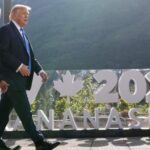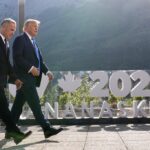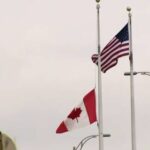In an atmosphere of mounting economic tension, Prime Minister Mark Carney convened an urgent virtual cabinet meeting yesterday evening to address the latest wave of tariff threats against Canadian exports. The hastily arranged session brought together key economic ministers and trade officials as Ottawa scrambles to formulate a cohesive response to what many analysts are calling the most significant trade challenge since the 2018-2020 USMCA negotiations.
“We’re facing a coordinated pressure campaign that demands an equally coordinated response,” a senior government source revealed to CO24 on condition of anonymity. “The Prime Minister wanted all hands on deck immediately, even with several ministers currently traveling internationally.”
The emergency meeting comes just 72 hours after the United States announced it was considering imposing a 25% tariff on Canadian aluminum and steel exports, alongside potential new duties on agricultural products including dairy, poultry, and maple syrup. These threats represent a dramatic shift in bilateral relations that had appeared to stabilize following Carney’s election victory last year.
Trade Minister Mary Ng, who joined the virtual session from Singapore where she’s attending ASEAN economic talks, reportedly presented cabinet with a three-tiered response strategy. According to sources familiar with the discussion, the approach includes immediate diplomatic engagement, preparation of targeted countermeasures, and acceleration of trade diversification efforts with European and Pacific partners.
“What makes this situation particularly challenging is the timing,” explains Dr. Sylvie Bérubé, Director of the International Trade Policy Centre at the University of Toronto. “With global supply chains still adjusting to post-pandemic realities and the new Asian trade bloc gaining momentum, Canada finds itself at a precarious crossroads of competing economic interests.”
Finance Minister Chrystia Freeland, who previously navigated Canada through the turbulent USMCA negotiations, emphasized the economic stakes during a brief statement following the meeting. “Canadian industries potentially affected by these tariff threats employ over 800,000 workers across the country. We are approaching this situation with both urgency and strategic patience,” she noted.
The CO24 Business analysis team has calculated that the threatened tariffs could impact approximately $42 billion in annual Canadian exports, with particularly severe consequences for communities in Quebec, Ontario, and British Columbia where steel and aluminum production is concentrated.
The Canada News desk has confirmed that Prime Minister Carney has directed preparations for a formal response that balances firmness with diplomatic pragmatism. Sources indicate the government is wary of escalating tensions while simultaneously demonstrating resolve to defend Canadian economic interests.
Industry representatives have already begun mobilizing in response. Jean Simard, president of the Aluminum Association of Canada, told CO24: “We’ve been down this road before. The integrated nature of North American supply chains means these tariffs would ultimately harm consumers and manufacturers on both sides of the border.”
Provincial leaders are also demanding involvement in the federal response. Quebec Premier François Legault and Ontario Premier Bonnie Crombie have both requested urgent consultations, citing the disproportionate impact these measures would have on their provincial economies.
Opposition leaders were quick to respond to news of the emergency meeting. Conservative Leader Pierre Poilievre criticized the government for being “caught flat-footed” despite warning signs, while NDP Leader Jagmeet Singh called for immediate support packages for potentially affected workers.
As diplomatic channels heat up, the question remains whether Canada’s traditional approach of measured response and coalition-building will prove effective in this new era of economic nationalism. Can a country that depends on trade for nearly 65% of its GDP successfully navigate increasingly protectionist global currents without sacrificing its economic sovereignty?

























